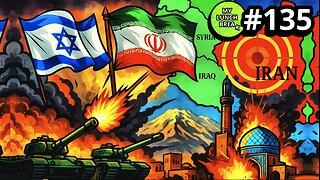Premium Only Content

Hitler's Speech in Munich – April 13, 1923
Background Leading Up to Hitler's Speech in Munich
Economic Instability: By April 1923, Germany was deep into an economic crisis. Hyperinflation was rampant, leading to widespread financial hardship. The cost of living soared, and the German mark lost much of its value.
Political Instability: The Weimar Republic continued to face significant political instability. Extremist movements, including the Nazis, gained traction as citizens grew increasingly disillusioned with the government’s perceived inability to handle the country’s problems.
Rise of the Nazi Party: Adolf Hitler and the Nazi Party were becoming more prominent in German politics. Their nationalist and anti-Semitic rhetoric resonated with a growing segment of the population frustrated by the economic and political turmoil.
Occupation of the Ruhr: In January 1923, French and Belgian troops occupied the Ruhr region, Germany’s industrial heartland, in response to Germany’s failure to pay reparations as mandated by the Treaty of Versailles. This occupation further exacerbated economic difficulties and national resentment.
Hitler's Speech in Munich – April 13, 1923
On April 13, 1923, Adolf Hitler delivered a speech in Munich, focusing on the dire situation in Germany and rallying support for the Nazi Party’s agenda.
Key Points of Hitler's Speech:
Condemnation of the Occupation of the Ruhr: Hitler began by condemning the French and Belgian occupation of the Ruhr. He framed it as a blatant act of aggression and humiliation against Germany, calling for a strong national response to reclaim the occupied territory.
Critique of the Weimar Government: He sharply criticized the Weimar government for its handling of the Ruhr occupation and the economic crisis. Hitler portrayed the government as weak and ineffective, accusing it of failing to protect German interests and sovereignty.
Economic Hardship: Addressing the rampant hyperinflation, Hitler empathized with the struggles of ordinary Germans. He blamed the economic crisis on the Treaty of Versailles and the incompetence of the Weimar politicians, promising that the Nazi Party would restore economic stability and national prosperity.
Nationalism and Unity: Hitler emphasized the need for national unity and pride. He called on Germans to reject internal divisions and to unite against common external and internal enemies, portraying the Nazi Party as the only force capable of leading this national revival.
Anti-Semitic Rhetoric: The speech included strong anti-Semitic rhetoric, with Hitler blaming Jews for Germany’s economic and social problems. He claimed that Jews were behind the country's financial woes and political instability, using this scapegoating to unify his audience against a perceived common enemy.
Call for Action: Hitler concluded his speech with a call to action, urging his listeners to support the Nazi Party and its efforts to overthrow the Weimar government. He presented the Nazi Party as the vehicle for Germany’s resurgence and demanded active participation from his followers.
Analysis:
Hitler’s speech on April 13, 1923, was a strategic effort to capitalize on the widespread discontent in Germany. By addressing key issues such as the occupation of the Ruhr, economic hardship, and political instability, Hitler aimed to galvanize support for the Nazi Party.
Exploitation of National Grievances: The speech effectively tapped into the national anger and resentment caused by the Ruhr occupation and economic crisis. By highlighting these grievances, Hitler sought to rally support for his radical solutions.
Critique of the Weimar Government: By portraying the Weimar government as weak and ineffective, Hitler aimed to delegitimize the current political order and position the Nazi Party as a strong and decisive alternative.
Nationalist and Anti-Semitic Appeals: The nationalist and anti-Semitic elements of the speech were designed to create a unified enemy and channel public frustration towards specific targets. This tactic was intended to consolidate support among those who felt betrayed and marginalized.
Vision of Strong Leadership: Hitler’s emphasis on strong leadership and national unity was intended to attract those who longed for decisive action and a clear direction. By promising a return to stability and prosperity, he aimed to build a broad base of support.
Mobilization of Support: The call to action at the end of the speech aimed to convert passive discontent into active political engagement. Hitler sought to mobilize his audience into a cohesive force capable of challenging the Weimar government.
Overall, Hitler’s speech in Munich on April 13, 1923, was a calculated effort to harness the widespread discontent and to position the Nazi Party as the solution to Germany’s crises. By addressing key national issues, criticizing the government, and promoting a vision of strong leadership and unity, Hitler aimed to solidify his leadership and expand the influence of the Nazi Party in the turbulent political landscape of the Weimar Republic.
-
 1:15:42
1:15:42
The Connect: With Johnny Mitchell
1 day ago $1.50 earnedHow Did This Happen? Male Escort Who Testified Against Diddy Exposes LIES About Government's Case
7.5K5 -
 21:25
21:25
MYLUNCHBREAK CHANNEL PAGE
6 hours agoIran: The Target
18.4K7 -
 LIVE
LIVE
Midnight In The Mountains
2 hours agoMidnight In The Mountains | Episode 6 | Feat: Joker & VapinGamers | Caught On Camera!
282 watching -
 2:41:18
2:41:18
Barry Cunningham
6 hours agoIT IS UPON US! PRESIDENT TRUMP IS BRINGING A FIERCE STORM TO WASHINGTON, DC!
60.9K85 -
 12:23
12:23
Exploring With Nug
23 hours ago $4.64 earnedSUV Found In Private Pond While Searching For Missing Man!
30K6 -
![[ CHiLi's Cook Out # 13 ] Cooking w/ the Fam is Always Gewd!!](https://1a-1791.com/video/fww1/4c/s8/1/e/U/O/3/eUO3y.0kob-small--CHiLis-Cook-Out-13-Cooking.jpg) LIVE
LIVE
CHiLi XDD
2 hours ago[ CHiLi's Cook Out # 13 ] Cooking w/ the Fam is Always Gewd!!
42 watching -
 53:57
53:57
Tactical Advisor
7 hours agoUnboxing New Guns and Mystery Box | Vault Room Live Stream 033
53.8K7 -
 LIVE
LIVE
King Alexander
2 hours ago"Operation Global Conquest: Live Call of Duty Stream with Alex" vol52
11 watching -
 1:15:16
1:15:16
Jeff Ahern
9 hours ago $10.47 earnedThe Saturday Show with Jeff Ahern
50.3K6 -
 LIVE
LIVE
ManoloCalifas
1 hour ago🔴 LIVE - WARZONE WEEKEND IS FOR THE BOYZ
8 watching